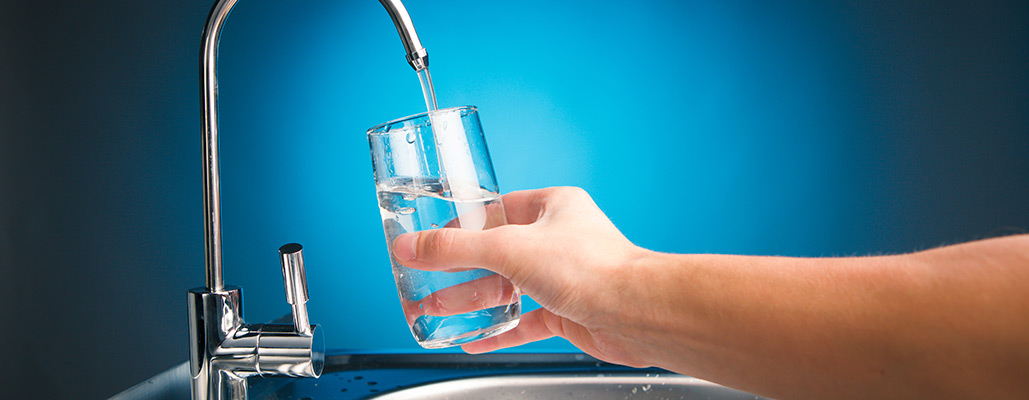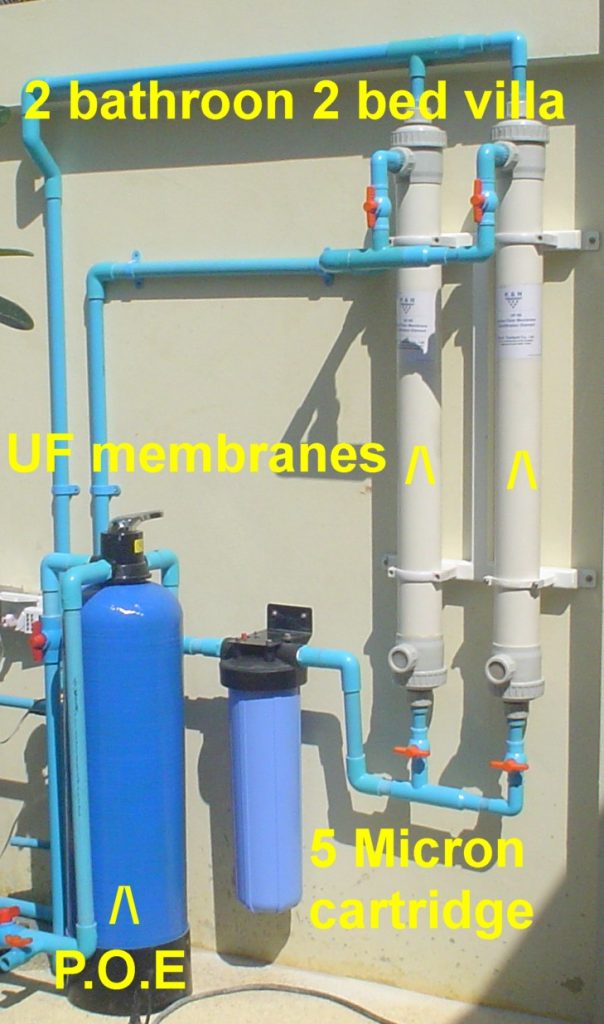
One of my customers had a drinking water R O (Reverse Osmosis) system installed on his house in Pattaya, Thailand. The water was from a well and the TDS level (Total Dissolved solids) was at around 2000 ppm. This is way above the recommended ceiling of 500 ppm. It is a new estate and the city water was not available at that time. City water is not that reliable either and he wasn’t willing to be without water. He had been using the well water to water his plants (which were showing signs of burning leaves) and he was seeing a white deposit being left on his sinks.

When I investigated, I new straight away it was a salt residue. So I did a simple test with the TDS meter and informed him of his only solution; an R.O System that will supply clean water for everything including DRINKING. We manufacture these here in Pattaya to very high quality and with minimum maintenance. It is two years now since the RO was installed and the city water had been connected.
I told my customer not to drink the city water but I was a week too late.
The dog nearly died, his wife was coughing up blood and he was nearly hospitalised from the water. He asked me to install a new system I supply which is UF (Ultra Filtration) membrane technology. This system is comprised of a point of entry (P.O.E.) filter with “Eco Clear” recycled glass media to take out solids and iron. Then a .5 micron cartridge filter to protect the UF membrane. Then the UF membrane that filters down to .2 microns and doesn’t let any bacteria or viruses through. I have installed dozens of these now in Pattaya and Phuket with many happy customers having drinking water at every tap in the house!
Drinking water
Drinking water is water that is intended to be ingested by humans. Water of sufficient quality to serve as drinking water is termed “potable water” whether it is used as such or not. Although many fresh water sources are utilised by humans, some contain disease vectors or pathogens and cause long-term health problems if they do not meet certain water quality guidelines. Water that is not harmful for human beings is sometimes called safe water, water which is not contaminated to the extent of being unhealthy.
As of the year 2006 (and pre-existing for at least three decades), there is a substantial shortfall in availability of potable water in lesser developed countries, primarily arising from overpopulation. As of the year 2000, 37 percent of the populations of lesser developed countries did not have access to safe drinking water. Implications for disease and sickness are very significant. Many nations have water quality regulations for water sold as drinking water although these are often not strictly enforced outside of the developed world.

The World Health Organization
Sets international standards for drinking water. TDS levels need to be below 500 ppm here in Thailand which is the same as the USA whilst in Oz it is 200ppm. After the installation of the above R.O. machine we did a test on the water with my TDS meter and the reading was 30ppm whilst a bottle of brewery water was 450 ppm!
Typically water supply networks deliver a single quality of water, whether it is to be used for drinking, washing or landscape irrigation; one counterexample is urban China, where drinking water can be optionally delivered by a separate tap. In the United States, public drinking water is governed by the Safe Drinking Water Act (SDWA). Among other provisions, it protects the right of employees to report potential violations. Within 30 days of any retaliation, a whistleblower can file a complaint with the Occupational Safety and Health Administration (OSHA). Not so here in LOS. “Thailand”

The standard test
For bacterial contamination is a laboratory analysis of coliform bacteria, a convenient marker for a class of harmful fecal pathogens. The presence of fecal coliform (like Escherichia coli) serves as an indication of contamination by sewage. I have been told that a southern large Island with a mini Pattaya night scene has a very high E coli reading which is being kept quiet!
Water is essential for all life on Earth, including mammals and by extension mankind. Humans can survive for several weeks without food, but for only a few days without water. A constant supply is needed to replenish the fluids lost through normal physiological activities, such as respiration, sweating and urination. Water generated from the biochemical metabolism of nutrients provides a significant proportion of the daily water requirements for some arthropods and desert animals, but provides only a small fraction of a human’s necessary intake.
There are a variety of trace elements present in virtually all potable water, some of which play a role in metabolism; for example sodium, potassium and chloride are common chemicals found in very small amounts in most waters, and these elements play a role (not necessarily major) in body metabolism. Other elements such as fluoride, while beneficial in low concentrations, can cause dental problems and other issues when present at high levels.


“WET” Water Engineered Technologies (Thailand) offer a broad range of water filtration solutions including swimming pool design, construction, equipment and consultation.
Steve can be contacted on Tel: +66 (0) 8484 28317 or email info@poolsasean.com







You must be logged in to post a comment.